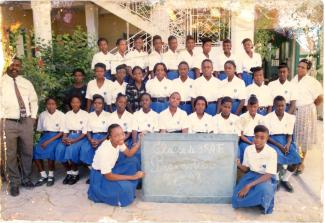Thorough preparation for integration into Quebec society, a quick entry into the job market, and constant evolution are the defining elements of Darling Étienne Métayer’s immigration story.
As part of the Women’s Stories of Immigration project, the MEM – Centre des mémoires montréalaises met with women who have settled in Montréal from elsewhere to hear about their experiences. Our Stories series maps unique life paths that intersect across the city, shaping its history.
—
The Haitian community’s contribution to Quebec society dates all the way back to the mid-1960s. At the time, Haitian professionals immigrated to Quebec to escape the Duvalier regime and fill gaps in the Quebec labour market.
Well-prepared for immigration
Darling Étienne Métayer

In October 2017, while Darling was doing an employability program run by Le Collectif, her career counsellor sent Darling’s résumé to the organization’s management team for a job opening as a frontline worker. It was a valuable lesson in how vital networking can be in Quebec, where employers post only twenty percent of job offers and fill the other eighty percent via the hidden job market. Darling’s first job was as a seamstress. “I’d already adapted to the professional world, to how everything worked, even though it wasn’t my field,” she said. She also notes that this first work experience in Quebec helped her obtain a job with Le Collectif, where she provides support to the regionalization and recruitment team. She took advantage of the opportunity, despite it not being in accounting.
Finding the right fit
Darling Étienne Métayer 1997

In Canada, 60.1% of newly arrived immigrant women (aged 25 to 54 years) with a bachelor’s degree or a post secondary diploma hold jobs that do not correspond to their level of schooling (Statistics Canada, 2011). Darling likes working in an environment with a social justice mission, in a similar vein to her ten years spent as head of accounting for a credit union in Port-de-Paix and Port-au-Prince, Haiti. Since she began working for Le Collectif, she’s become fondly known as “Darling chérie” by the organization’s president, Aoura Bizzarri—a nod to the Othello Bayard song Haïti chérie.
Immigrant women face more job-market barriers compared to women born in Canada, with an employment rate of 72% versus 82% (Statistics Canada, 2017), even though immigrant women are more likely to be university educated. Challenges include difficulty accessing daycare services and the comparative evaluation of degrees. Darling was lucky: she managed to find a subsidized daycare spot for her four-year-old daughter quite easily and enrol her oldest child in elementary school. Despite her bachelor of accounting science from Port-au-Prince University, Darling has been taking evening classes since August 2018 to obtain an applied finance certificate from HEC Montréal.
Darling Étienne Métayer 2018

Integration was more difficult for Darling’s husband, who had taught history and geography in Haiti. Six months after they arrived, he found work in various factories and a call centre. He then took a training course to become a security guard and worked on-call before securing a permanent position. Between evening classes and her work with Le Collectif, Darling also had her home life to manage; she was a wife and mother. Life in Quebec brought new challenges. “Back home, a woman’s job is to stay at home and look after the house, and my husband still has that mentality. ... You’ve got to juggle work, family, and everything. It’s really difficult,” says Darling, laughing. What is central to Darling’s immigration story is preparation, openness, and true determination.
ICART, Lyonel. « Haïti-en-Québec, Notes pour une histoire », [En ligne], Ethnologies, vol. 28, no 1, 2006, p. 45-79.
https://www.erudit.org/en/journals/ethno/2006-v28-n1-ethno1446/014148ar/
MORIN, Françoise. « Entre visibilité et invisibilité : les aléas identitaires des Haïtiens de New York et Montréal », [En ligne], Revue européenne des Migrations Internationales, vol. 9, no 3, 1993, p. 147-176.
https://www.persee.fr/doc/remi_0765-0752_1993_num_9_3_1373
ISSAD, Lahouaria, et Andrew FIELDS. « Séries d’analyses de la population active immigrante. Les immigrants sur le marché du travail canadien : tendances récentes entre 2006 et 2017 », [En ligne], Statistique Canada.
https://www150.statcan.gc.ca/n1/pub/71-606-x/71-606-x2018001-fra.htm
HUDDON, Tamara. « Les femmes immigrantes », [En ligne], Statistique Canada.
https://www150.statcan.gc.ca/n1/pub/89-503-x/2015001/article/14217-fra.htm



